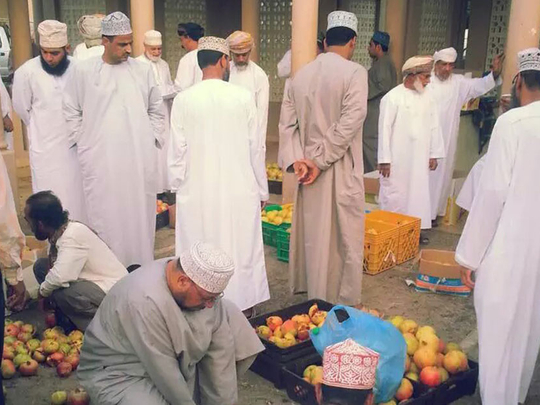
Muscat: Omani farmers have started harvesting pomegranate crop in Jebel Al Akhdar mountain, the fruit from this part is considered by many as some of the most sought-after variety in the region.
In the markets in Jebel Al Akhdar and Nizwa province it is common to see pomegranates in abundance these days, and it is expected to last until the end of October.
The demand for Omani pomegranates is huge and a steady stream of visitors — both residents and tourist — flock Jebel Al Akhdar and Nizwa to buy the fruit.
Part of the Hajar mountain range, Jebel Al Akhdar (the Green Mountain) is approximately a two-hour drive from the capital where cooler climate allows for the growth of pomegranates, grapes, strawberries, raspberries, plums, figs, almonds, walnuts, pears and apricots.
Its highest peak, Jebel Shams (Mountain of the Sun) is 3,000m high, and is widely believed to be the highest peak in Eastern Arabia and the Gulf states.
There are around 23,000 pomegranates trees in Jebel Al Akhdar alone, according to the figures from the Ministry of Agriculture and Fisheries.
It grows in areas like Seeq, Al Aain, Al Shraigah, Wadi Bani Habib and Saloot villages of Jebel Al Akhdar.
The Omani pomegranate is known of its light red colour and sweet taste and fragile seeds.
Some fruit can weigh in excess of 1kg, according to farmers.
Rashid Al Hatali, local farmer, told Gulf News pomegranate trees in his garden in Al Aain village, is his main source of income.
Temperatures in Jabel Al Akhdar’s villages often dip to below zero in winter and snow is not uncommon there. Temperatures are moderate in the summer, not exceeding 20 degrees Celsius. This often attracts tourists from warmer parts of Oman and the region to the mountain.
“I earn more than 4,000 rials from selling pomegranate alone in Nizwa market”, says Al Hatali.
Haza Al Muqbali, a resident of Ibri, told Gulf News, that he buys pomegranates in bulk and sells them in neighbouring countries like the UAE and Saudi Arabia.
Al Muqbali added that he makes good profits from the sale of pomegranates.
Farmers here attribute their long life to the fruit.
It contains high levels of antioxidants, polyphenols and flavonoids which protect from the cancer and other diseases like heart disease and atherosclerosis as well as stomach illness.
Oman imports pomegranates worth more than $2m from Jordan, Iran, Yemen, India and Egypt every year, according to the Ministry of Agriculture and Fisheries.











